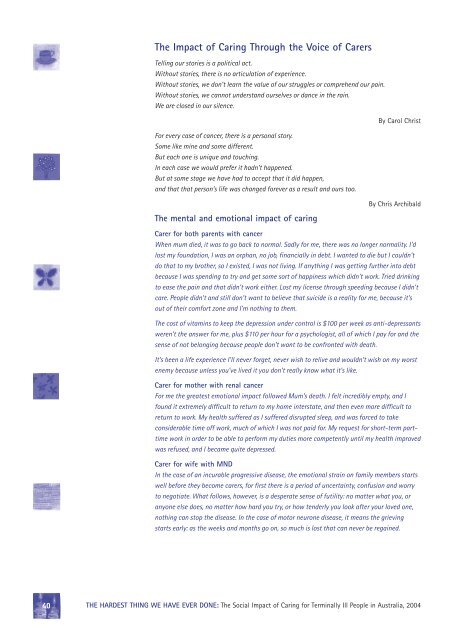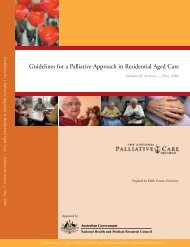The hardest thing we have ever done - Palliative Care Australia
The hardest thing we have ever done - Palliative Care Australia
The hardest thing we have ever done - Palliative Care Australia
You also want an ePaper? Increase the reach of your titles
YUMPU automatically turns print PDFs into web optimized ePapers that Google loves.
<strong>The</strong> Impact of Caring Through the Voice of <strong>Care</strong>rs<br />
Telling our stories is a political act.<br />
Without stories, there is no articulation of experience.<br />
Without stories, <strong>we</strong> don’t learn the value of our struggles or comprehend our pain.<br />
Without stories, <strong>we</strong> cannot understand ourselves or dance in the rain.<br />
We are closed in our silence.<br />
By Carol Christ<br />
For <strong>ever</strong>y case of cancer, there is a personal story.<br />
Some like mine and some different.<br />
But each one is unique and touching.<br />
In each case <strong>we</strong> would prefer it hadn’t happened.<br />
But at some stage <strong>we</strong> <strong>have</strong> had to accept that it did happen,<br />
and that that person’s life was changed for<strong>ever</strong> as a result and ours too.<br />
By Chris Archibald<br />
<strong>The</strong> mental and emotional impact of caring<br />
<strong>Care</strong>r for both parents with cancer<br />
When mum died, it was to go back to normal. Sadly for me, there was no longer normality. I’d<br />
lost my foundation, I was an orphan, no job, financially in debt. I wanted to die but I couldn’t<br />
do that to my brother, so I existed, I was not living. If any<strong>thing</strong> I was getting further into debt<br />
because I was spending to try and get some sort of happiness which didn’t work. Tried drinking<br />
to ease the pain and that didn’t work either. Lost my license through speeding because I didn’t<br />
care. People didn’t and still don’t want to believe that suicide is a reality for me, because it’s<br />
out of their comfort zone and I’m no<strong>thing</strong> to them.<br />
<strong>The</strong> cost of vitamins to keep the depression under control is $100 per <strong>we</strong>ek as anti-depressants<br />
<strong>we</strong>ren’t the ans<strong>we</strong>r for me, plus $110 per hour for a psychologist, all of which I pay for and the<br />
sense of not belonging because people don’t want to be confronted with death.<br />
It’s been a life experience I’ll n<strong>ever</strong> forget, n<strong>ever</strong> wish to relive and wouldn’t wish on my worst<br />
enemy because unless you’ve lived it you don’t really know what it’s like.<br />
<strong>Care</strong>r for mother with renal cancer<br />
For me the greatest emotional impact follo<strong>we</strong>d Mum’s death. I felt incredibly empty, and I<br />
found it extremely difficult to return to my home interstate, and then even more difficult to<br />
return to work. My health suffered as I suffered disrupted sleep, and was forced to take<br />
considerable time off work, much of which I was not paid for. My request for short-term parttime<br />
work in order to be able to perform my duties more competently until my health improved<br />
was refused, and I became quite depressed.<br />
<strong>Care</strong>r for wife with MND<br />
In the case of an incurable progressive disease, the emotional strain on family members starts<br />
<strong>we</strong>ll before they become carers, for first there is a period of uncertainty, confusion and worry<br />
to negotiate. What follows, ho<strong>we</strong>ver, is a desperate sense of futility: no matter what you, or<br />
anyone else does, no matter how hard you try, or how tenderly you look after your loved one,<br />
no<strong>thing</strong> can stop the disease. In the case of motor neurone disease, it means the grieving<br />
starts early: as the <strong>we</strong>eks and months go on, so much is lost that can n<strong>ever</strong> be regained.<br />
40 THE HARDEST THING WE HAVE EVER DONE: <strong>The</strong> Social Impact of Caring for Terminally Ill People in <strong>Australia</strong>, 2004
















